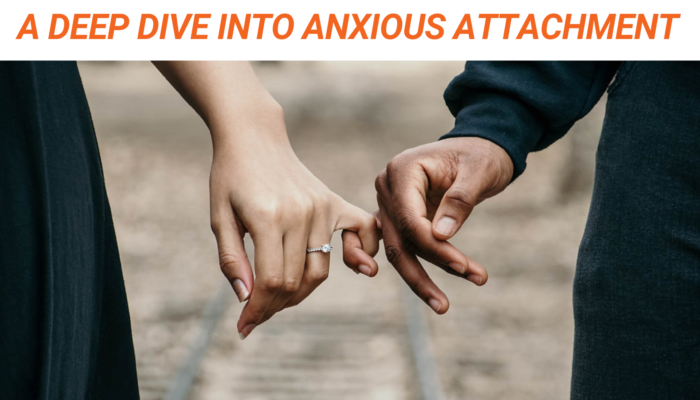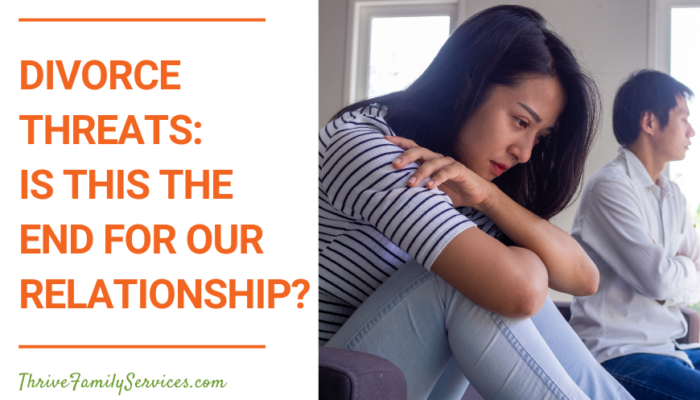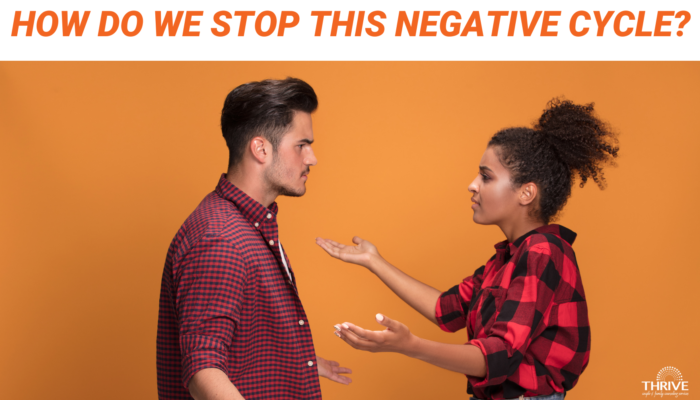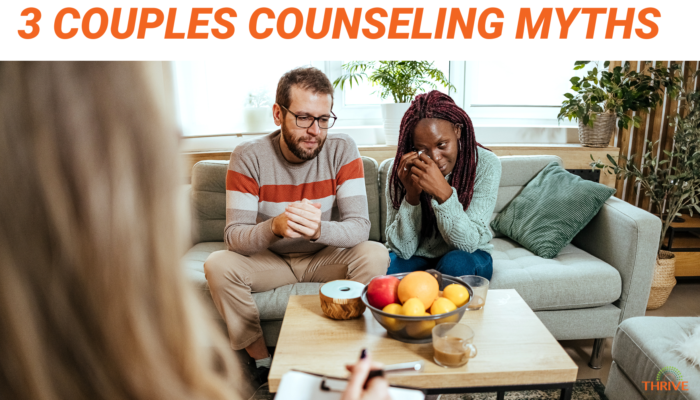A Brief Introduction to Attachment Styles
As a relationship therapist, there is one blatant fact about humanity that shows up with every client that I see: People are wired for connection. In fact, people will do whatever they feel like they need to do in order to ensure that their relationships survive for their own well-being.
From birth, babies need other people for survival, and this fact stays consistent across the lifespan. No matter how old a person is, humans need connection with other people to thrive. Scientific research shows that people with at least one secure, connecting relationship live longer, happier, healthier lives than people who do not.
When a person loses connection with other people for a period of time, their brain actually starts to deteriorate, feelings of fear and anxiety start to escalate, and their body’s stress response goes into overdrive. Have you ever tried to go to work while in the middle of a fight with your partner? Chances are that it was difficult to stay focused and present at work because the feelings of a loss of security are so intense. This need for human connection is actually one of the reasons why solitary confinement has such awful consequences on the psyche!
Needless to say, our human instincts direct us to do whatever we need to do to make sure that our relationships don’t fall apart. However, what a person does to maintain their sense of connection depends on their unique relationship history and experiences.
Psychologists John Bowlby and Mary Ainsworth actually used this fact to do research to determine the ways that children learn to connect with their parents and how that translates to connection in their adult relationships. In this research, Bowlby and Ainsworth observed four different ways that people learn to attach to each other. They labeled these four types as “attachment styles.”
The four attachment styles are: secure, anxious, avoidant, and disorganized.
In my work as a relationship therapist, I determine my clients’ attachment styles as a way to categorize how each person has learned to operate in order to maintain their sense of relationship security. I’ve found that it can be helpful for my clients to make sense of their own attachment styles.
So, let’s get to know more about people with an Anxious Attachment style!
How to Identify an Anxious Attachment Style
Research shows that about 20% of the population has an anxious attachment style. Adults with an anxious attachment style are generally the most sensitive to relationship and emotional disconnection compared to the other three styles. Adults with anxious attachment are commonly called “pursuers” in Emotionally Focused Therapy because they use pursuing behaviors to get disconnection resolved.
These pursuing behaviors can look like:
- Complaining
- Criticizing
- Provoking
- Managing the emotions of others
- Blowing up after holding in a lot of emotional pressure
Remember how attachment styles help categorize the ways that people learn to keep their relationships in a secure place? Adults with an anxious attachment style have adapted pursuing behavioral strategies as their best tool for ensuring relationship survival. This is because they often fear abandonment, so they try to seek closeness while protecting their own vulnerable needs and emotions.
A pursuer’s behaviors all come from the intention of trying to get their partner to respond to their distress.
They are looking for a response in order to repair disconnection while also protecting those vulnerable emotions and needs. Pursuers feel soothed when their partner is emotionally attuned and responsive, and they get pretty anxious when they feel like their relationship is being threatened by emotional avoidance. They tend to seek a lot of validation from their partner as a way to feel more secure, craving feelings of deep connection and lasting love.
Because they are so sensitive to signs of disconnection and feel anxious about resolving that disconnection, pursuers often take on frustrated or demanding positions in the relationship in an effort to protect their own vulnerable feelings while also combatting their feelings of loneliness or insecurity. Instead of communicating these emotions and needs to their partner, they tend to act (or react) in protective, unclear ways. They might end up coming across as attacking, clingy, distrusting, or insecure.
Anxious Attachment + Relationship History
Somewhere in a pursuer’s past, they learned that they need to be hypersensitive to signs that their important person is going away (emotionally or physically) in order to keep the relationship in a good place. Pursuers are so aware of feelings of disconnection, even if the amount of time was minuscule. At some point in their life, pursuers probably felt a threat of abandonment or rejection from a parent – or actually experienced abandonment or rejection in a relationship.
In summary, a child with an anxious attachment learned that sometimes their parent would be tuned into his or her emotions, but other times, their parent would be inconsistent or unpredictable. This makes it difficult for the child to trust that their parent will always show up for them when they’re in distress. However, they still feel that natural longing to want to feel close to their parents. This leaves them feeling anxious about what they need to do in order to get that connection back.
Here are some examples of people who had relationships that resulted in an anxious attachment style:
- As a kid, Layla learned that when her parents were happy, they were attentive and responsive to her. However, when they were fighting with each other, they didn’t seem to notice Layla much. As a result, Layla learned to be hypersensitive to signs that her parent’s marriage was in a bad place so she could protect her own emotional vulnerability and not risk getting rejected by them.
- Kallie’s parents divorced when she was 8 years old, and after that, she barely saw her dad. When her dad was gone, Kallie couldn’t stop thinking about him. However, when she called, her dad rarely picked up the phone. Kallie worried a lot about what she needed to do in order to get her dad to “like” her again.
- Everett didn’t get a lot of attention from his parents when he was quiet, but he learned that when his emotions got big and loud, his parents would give him a lot of attention, hugs, and comfort. Now as an adult, when Everett gets big and loud with his emotions with his partner, his partner goes away. Everett learned as a kid that his emotions bring people closer, but now as an adult, his emotions seem to push his partner away. He doesn’t know what to do differently and constantly feels anxious about pushing his partner away.
Anxious Attachment Triggers
Pursuers can be extremely sensitive to signals of abandonment. There are several triggers that can result in them feeling anxious about the state of the relationship. In general, a pursuer might be reactive towards any trigger that might make them start to wonder, “What is it about me that is pushing my partner away? Maybe they don’t care about me… maybe I am too much… I must have done something wrong.”
Some common examples of anxious attachment triggers include:
- Unresponsiveness – This is one of the most common triggers for pursuers. If a pursuer sees a lack of responsiveness from their partner, they may react with a lot of anger or anxiety. This perception of unresponsiveness could be anything from “My partner didn’t answer my call” to “My partner was dismissive to my emotions.”
- Unpredictable behavior – When pursuers see their partner as having inconsistent behavior or “Saying the right thing, but not following through,” they tend to get very anxious about the state of the relationship. Pursuers like to know that their partner will consistently be accessible and responsive to their emotions and needs. When they don’t feel this, their fears about the relationship get triggered.
- Distance – Whether it’s physical or emotional distance, not feeling close to one’s partner can be very distressing for someone with an anxious attachment style. For most people, it doesn’t feel good to have distance in their relationship, but when a pursuer’s attachment fears are triggered, distance tends to compound the anxiety. This could be anything from “We haven’t spent a lot of quality time together lately” to “You’re going to work after we just had a big fight!”
- Perceived threats to the relationship – One of the most difficult triggers for partners of someone with an anxious attachment style is that communicating their unpleasant emotions doesn’t seem to help. Although pursuers long to feel a sense of security in the relationship, they tend to seek it out through protesting signs of disconnection. So when a husband says to his pursuer wife, “We haven’t had very much sex lately, and it makes me sad,” the wife might hear her husband’s vulnerability as a threat to the relationship and react with shame, defensiveness, fear, or anger.
Responding to Your Anxious Attachment Style
If you identify as the pursuer in your relationship, then you know that everything you’re doing is your way to try to find a deep connection and a sense of security with your most important person. However, it probably feels difficult to communicate your fears, needs, and emotions in a clear, vulnerable way.
There isn’t a way to “fix” an anxious attachment style without a secure relationship. This is because having an anxious attachment style is a relational trait – not an individual one.
Remember that all humans are wired for connection to other people, so your anxious attachment style is how you learned to keep that sense of connection.
Emotionally Focused Therapy is one of the best ways to find that sense of security to soothe your anxiety. Whether you start therapy individually, as a couple, or with your family, seeing an Emotionally Focused Therapist can give you the safety and security that you need in order to start communicating in your relationships in a way that is closer to what you want.
You can also try journaling or self-reflection as ways to pinpoint the times where you find yourself reacting protectively instead of communicating clearly. See if you can explore the reasons why you developed an anxious attachment style, and communicate this to someone you trust.
Responding to Your Partner’s Anxious Attachment Style
If you recognize that you are in a relationship with someone who has an anxious attachment style, it’s important to remember that your partner is reacting the way he or she is because they don’t want to lose their relationship with you. See if you can give your partner safe, secure, attuned signals the next time he or she is trying to tell you that they want to make sure your relationship is okay. Help them feel safe enough to communicate their needs and emotions in a vulnerable way.
Call us today at 303-513-8975 to learn more about how understanding your attachment style can help your relationship. Or, schedule an appointment here, using our simple and secure online scheduler.




